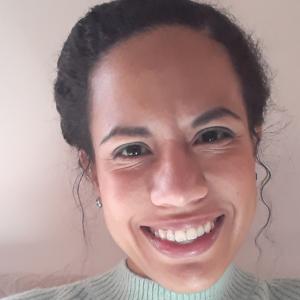
Education:
PhD in Biochemistry '20
Advisor: Meta Kuehn
BS Industrial Biotechnology
University of Puerto Rico at Mayagüez '14
Nichole teaches at Lasell University, a small liberal arts institution outside Boston. She wants all her students to know that science isn't just for scientists.
On Choosing Lasell University, a Small Liberal Arts Institution
While I was participating in Duke's Preparing Future Faculty program (PFF), I learned there are different types of schools you can work at. For example, there are some that focus on teaching (where I am now), others that focus on research like R1 institutions, and others that have a balance between teaching and research. PFF allowed me to explore different schools, to speak with faculty at different institutions about their day-to-day responsibilities, and to figure out where I would best fit in.
I realized that I wanted a split between teaching and research and that a smaller university would be a good fit for me. As an Assistant Professor in Biology, I have had up to 12 students in class and a couple more via Zoom, but my class was capped at 24 students. The small class size allows me to get to know my students, introduce them to research, and advise them on a deeper level. In all, taking a faculty position at a smaller institution focused on teaching lets me teach and mentor and really get to know my students, while still having the opportunity to do some research but on a smaller scale.
The Road to Duke
While an undergraduate, I attended a summer research program at Penn State University (SROP – Summer Research Opportunities Program) that beyond opening my world to graduate school research, gave me practical skills on how to apply to graduate school, how to write a personal statement, and how to interview. After completing SROP, I attended the ABRCMS (Annual Biomedical Research Conference for Minority Students) where I met Dr. Brennan and liked what I heard about Duke’s program. But it was when I interviewed on campus, that I appreciated the friendly environment, that North Carolina wasn’t too far from my home in Puerto Rico, and that my stipend would afford me a good standard of living in Durham. Everything just fit together.
On Preparing for a Career
The department, and especially my Primary Investigator, approved of me doing things outside research and encouraged me to explore my career options. Plus, the department provided opportunities to learn skills that I use daily at my current job. For instance, presenting my research at forums and conferences helped me build the skills to explain my science to an audience, and mentoring both graduate and undergraduate students in the lab gave me the confidence and soft skills to teach students who sometimes are just beginning to explore science and research at a deeper level.
Prospective Student Advice
I would advise that it’s ok to choose a different career path than initially intended and that it’s never too late to change your mind. First, you’ll find that the Biochemistry Department at Duke is a supportive environment that provides many opportunities to investigate your options. Second, your PhD is a time to explore, and you should give yourself some flexibility to find what best fits you and your goals. Academia isn’t the only career path—there’s also industry, government, teaching, scientific writing, consulting, etc. The Graduate School Career Center provides multiple resources to help you figure things out, but it’s up to you to put in the work.
Start in Science
Since I was little, I was interested in teaching, but I don’t think I showed an interest in science until I was in middle school and started doing local science fairs. My mother has always loved science and would help me craft the projects and posters. This got me interested in the scientific method, investigation, and reporting results!
Lab Work Prepares for Teaching
Lab work helped me develop patience and the skills to troubleshoot. Like with research, teaching sometimes doesn’t go as planned. I can think I’ve built the best lesson, but if students don’t grasp the subject matter, I have to start over again and find a teaching method that works. It is a lot like optimizing an experimental protocol.